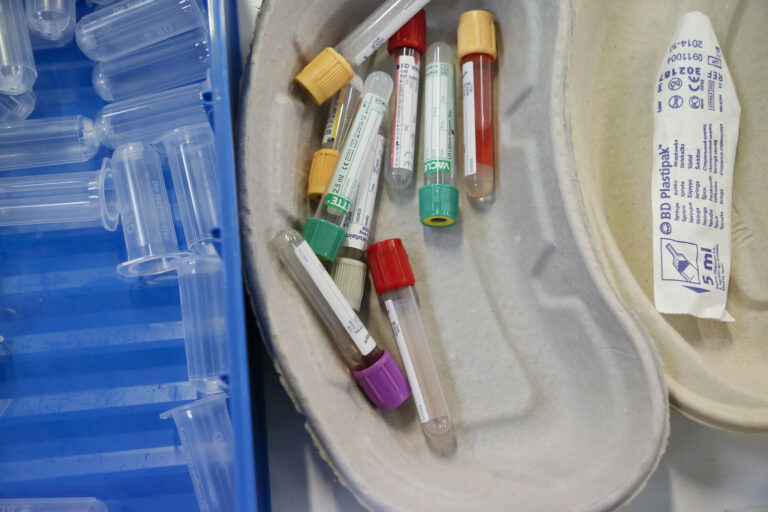
Debate and publications on medicine testing in poor countries
On Friday 17 December, Stichting Wemos, together with student association IFMSA-NL, is organising a screening of the English-language film ‘Body Hunters’, on the testing of medicines in India. Wemos will also be launching its book, which features the experiences of people who took part in clinical trials. Dutch Green Party MEP Judith Sargentini will be presented with the first copy. SOMO will be making an advance announcement of its new report on this theme.
‘Body Hunters’
Before a medicine can be brought onto the market, it must be tested on people in order to determine its safety and effectiveness. As the cost of testing medicines in the West has risen, and westerners have become increasingly negative about participating in clinical trials, pharmaceutical companies have moved a large proportion of their medicine testing to Asia, Latin America and Eastern Europe. India is one of the most popular new destinations for carrying out research into medicine. The industry is estimated to be worth billions of euros, and is a rapidly-growing sector.
Body Hunters examines the working methods of the pharmaceutical industry, taking India as its example. The film shows how clinical trials are carried out in countries in which the regulations are less strict and corruption is inevitable. These are often trials of medicines sold widely in the West. The film looks at whether this involves risk-taking on the part of the pharmaceutical companies: not just risks to the people in India taking part in these trials, but also in terms of the safety of medicine users in the West.
The filmmaker followed doctors, trial subjects and their families, campaigners for ethical testing and representatives of the pharmaceutical industry for a considerable period of time. He uses specific examples to highlight the pitfalls, corruption and serious consequences for the people who are desperately trying to earn money in any way possible, even if this means putting their own health in danger. It is clear that the people who suffer injury are abandoned to their fate, and have almost no opportunities to obtain justice.
Testimonies
To round off the film debate, Wemos will be launching its book "The Globalization of Clinical Trials: Testimonies from Human Subjects(opens in new window) ". The book contains testimonies of trial subjects who took part in clinical trials in Poland, Russia, the United States, China and India.
New SOMO report
During the debate SOMO makes its advance announcement of its new report, to be published in Februari "Getting Contract Research Organisations on the Radar(opens in new window) ". Pharmaceutical companies increasingly contract third parties to conduct their clinical trial work. This trend is referred to as ‘outsourcing’, and the companies to which the work is outsourced are called ‘contract research organisations’ (CROs). In addition, clinical trials are increasingly conducted in non-traditional trial regions, which are mainly low and middle income countries. This trend is called ‘offshoring’. It is widely agreed that the offshoring of clinical trials to non-traditional trial regions should be scrutinized from an ethical viewpoint as problems have occurred related to the poverty situation of trial participants. But what happens when offshoring is combined with outsourcing? Do additional ethical risks arise when the trials are contracted out? Are accountabilities still clear when the outsourcing model concerns a so-called ‘risk-share model’ in which the CRO also acts as sponsor? Virtually all pharmaceutical companies publicly declare that they test their drugs in accordance with the highest ethical guidelines such as the Declaration of Helsinki. But how do pharmaceutical companies safeguard their commitments when they outsource clinical trial activities to CROs in poor regions? These are the central questions in this report.
The report is based on research conducted in India, Argentina, Brazil and Peru, and combined with interviews with pharmaceutical companies and clinical trial experts. The research experiences demonstrate that the pharmaceutical sector is overall not transparent, which hinders the definite answering of the research questions. Nevertheless, the secondary and interview data collected in India, Argentina, Brazil and Peru provides some valuable insights in the way the CRO sector is developing in these countries. Furthermore, the report demonstrates that pharmaceutical companies have elaborate systems in place to manage their supply chain responsibility, but that nevertheless, experts, authorities and clinical trial practitioners in the selected non-traditional trial regions have grave concerns about the implementation of clinical trials in the respective countries.
See also:
- Download the Wemos publication "The Globalization of Clinical Trials: Testimonies from Human Subjects(opens in new window) "
- Download pre-announcement SOMO report "Getting Contract Research Organisations on the Radar(opens in new window) "
Related news
-
 EU health data law rolls out the red carpet for Big TechPosted in category:Long read
EU health data law rolls out the red carpet for Big TechPosted in category:Long read Irene SchipperPublished on:
Irene SchipperPublished on: -
Civil society coalition urges EU to put the interests of patients and citizens at the heart of the European Health Data SpacePosted in category:Published on:Statement
-



